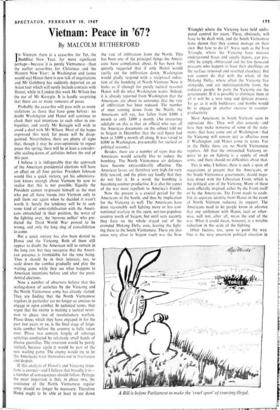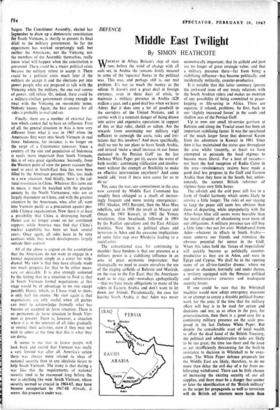Vietnam: Peace in '67?
By MALCOLM RUTH E R FOR D TN Vietnam there is a cease-fire for Tet, the 'Buddhist New Year, far more significant perhaps—because it is purely Vietnamese—than the earlier cease-fires for Christmas and the Western New Year: in Washington and (some would say) Hanoi there is new talk of negotiations and Mr Goldberg has suddenly departed on an Asian tour which will surely include contacts with Hanoi; while in London this week Mr Wilson has the ear of Mr Kosygin. It is hardly surprising that there are so many rumours of peace.
Probably the cease-fire will pass with as many violations as those that have gone before: no doubt Washington and Hanoi will continue to cloak their real intentions to each other in am- biguities; and surely Mr Kosygin will wish to avoid a deal with Mr Wilson. Most of the hopes expressed this week for peace will be disap- pointed. Nevertheless, there are plenty of signs that, though it may be over-optimistic to expect peace this spring, there will be at least a consider- able scaling-down of activities before the end of this year.
I believe it is indisputable that the approach of the American presidential elections will have an effect on all four parties. President Johnson would like a quick victory, yet his administra- tion knows enough about Vietnam by now to realise that this is not possible. Equally the President cannot re-present himself as the man who put all those troops into Vietnam only to pull them out again when he decided it wasn't worth it. Surely the tendency will be to seek some kind of semi-stabilisation with the Ameri- cans entrenched in their position, the worst of the fighting over, the 'nervous nellies' who pre- dicted the Third World War proved to be wrong, and only the long slog of consolidation to come.
But a quick victory has also been denied to Panoi and the Vietcong. Both of them still appear to doubt the American will to remain in the long run, but they recognise that the Ameri- can presence is formidable for the time being. Thus it should be in their interests, too, to scale down the combat gradually and play the waiting game while they see what happens to American intentions before and after the presi- dential elections.
Now a number of observers believe that this scaling-down of activities by the Vietcong and the North Vietnamese army has already started. They are finding that the North Vietnamese regulars in particular are no longer so anxious to engage in open combat. In technical terms, they argue that the enemy is making a tactical rever- sion to phase two of revolutionary warfare. Phase three, which they have engaged in for the past two years or so, is the final stage of large- scale combat before the country is fully taken over. Phase two consists largely of sabotage activities conducted by relatively small bands of elusive guerrillas. The reversion would be purely tactical, because again it would be part of the new waiting game. The enemy would try to let the Americans wear themselves out in frustration and despair.
If this analysis of Hanoi's and Vietcong inten- tions is correct—and I believe that broadly it is— a number of consequences should follow. Perhaps the most important is that, in phase two, the assistance of the North Vietnamese regular army should no longer be necessary. Therefore Hanoi ought to be able at least to cut down the rate of infiltration from the North. This has been one of the principal things the Ameri- cans have complained about. It has been fre- quently suggested that if only Hanoi would tacitly cut the infiltration down, Washington would gladly respond with a reciprocal reduc- tion of the bombing of North Vietnam. Now it looks as if (though for purely tactical reasons) Hanoi will do what Washington wants. Indeed, it is already reported from Washington that the Americans are about to announce that the rate of infiltration has been reduced. The number of men coming down from the North, the Americans will say, has fallen from 8,000 a month to only 3,000 a month. (An interesting sidelight on this is that an official who sees all the American documents on the subject told me in Saigon in December that the real figure had been at 3,000 a month all along. It was raised to 8,000 in Washington, presumably for tactical or political reasons.) Besides, there are a number of signs that the Americans would actually like to reduce the bombing. The North Vietnamese air defences have become extraordinarily effective. The American losses are therefore very high for very little reward, and the pilots say loudly that they do not like it. In a word, the bombing is becoming counter-productive. It is also the aspect of the war most repellent to America's friends.
Now the present is a crucial period for the Americans in the South, and thus by implication for the Vietcong as well. The Americans have done reasonably well fighting more or less con- ventional warfare in the open, not-too-populous country north of Saigon, but until very recently they have on the whole stayed out of the crowded Mekong Delta area, leaving the fight- ing there to the South Vietnamese. There are also areas very close to Saigon (such was the Iron
A Bill is before Parliament to make the 'cruel sport' of coursing illegal.
r n n n 41•111 I 1141
Triangle) where the Vietcong have held undis- puted control for years. These, obviously, will have to be dealt with, and the South Vietnamese
have shown that they cannot manage on their own. But how to do it? Areas such as the Iron Triangle, where the Vietcong have massive underground bases and supply depots, can pos- sibly be simply obliterated and the few thousand peasants who happen to have their dwellings on the surface removed and resettled elsewhere. But you cannot do that with the whole of the Mekong Delta, where often the Vietcong live alongside, and are indistinguishable from, the ordinary people. In parts the Vietcong are the government. If it is possible to eliminate them at all it will be a very long and delicate process. To go at it with bulldozers and bombs would be to engage in another exercise in counter- productivity.
Most Americans in South Vietnam seem to appreciate this. They will also concede—and here they make nonsense of some of the state- ments that have come out of Washington—that the Vietcong will remain just as effective even if Washington and Hanoi come to terms. For in the Delta there are no North Vietnamese regulars. All that the entrenched Vietcong re- quire to go on fighting is a supply of small arms, and there should no difficulties about that.
This is why, I believe, there is such a spate of suggestions at present that the Americans, or the South Vietnamese government, should nego- tiate direct with the Liberation Front, which is the political arm of the Vietcong. Many of these seem officially inspired, either by the Front itself or by the Americans. The Front needs to estab- lish its separate identity from Hanoi in the event of North Vietnam reducing its support. The Americans need to let people know in advance that any settlement with Hanoi, tacit or other- wise, will not, after all, mean the end of the war. What it could mean, however, is a notable reduction in the scale of the fighting.
Other factors, too, seem to point the way. One is the very uncertain political situation in
Saigon. The Constituent Assembly, elected last September to draw up a democratic constitution tar South Vietnam, is shortly to present its final drift to the military government. So far the experiment has worked surprisingly well, but neither the Americans, nor the Vietcong, nor the members of the Assembly themselves, really know what will happen when the constitution is presented. There could be a major political crisis because the military refuse to accept it. There could be a political crisis much later if the military do accept it and the elections put into power people who are prepared to talk with the Vietcong while the military, the one real source of power, still refuse. Or, indeed, there could be a military-civilian government strong enough to treat with the Vietcong on reasonable terms. Nobody knows. Again, the best answer for all sides is probably to wait and see.
Finally, there are a number of external fac- tors which cannot fail to have an influence. First of .all, the general situation in Asia is now very different from what it was in 1965 when the Americans first went into South Vietnam in real force. Indonesia, for instance, is no longer on the verge of a Communist takeover. Since a country of the size and population of Indonesia is vastly more important than South Vietnam, this is of very great significance. Secondly, from the Western point of view the power vacuum that used to exist in South-East Asia has now been filled by the American presence. This, too, leads to a new situation. And thirdly, there is the cul- tural revolution in China. Whatever this turns out to mean, it must be watched with the greatest anxiety by the North Vietnamese, who are so largely dependent on China, and with the greatest attention by the Americans, who, after all, went into Vietnam partly as a precaution against pos- sible Chinese expansionism. Now there is at least a possibility that China is destroying herself. Hanoi can no longer count on her continued support, while America may find that China's nuclear capability has been set back several years. Once again, all sides have to be very cautious while they watch developments largely outside their control.
All of the above is argued on the assumption that the Americans do not want to engage in a formal negotiation simply as a cover for with- drawal. My view is that they have already made too much progress for that to be either neces- sary or desirable. It is also strongly coloured by the feeling that in a situation so fluid as that in South Vietnam formal negotiations at this stage would be of advantage to no one except possibly Hanoi, which, as I have tried to show, is only half the enemy. My view again is that negotiations are only useful when all parties can meet to acknowledge formally what has become an accepted de facto situation. There is no permanent de facto situation in South Viet- nam at present. There is, however, a situation where it is in the interests of all sides gradually to restrict their activities, even if they may not wish to admit at the lime that this is what they are doing.
It seems to me that in future people will look back and record that Vietnam was really a very limited war after all. America's action there was always more related to ideas of national security than to any idealistic desire to help South Vietnam. The irony is that during a war like this the requirements of national security tend to be reassessed long before the war is anything like won. South Vietnam, whose security seemed so crucial in 1964-65, may have become unimportant by 1967-68. Already, it seems, this process is under way.



































 Previous page
Previous page